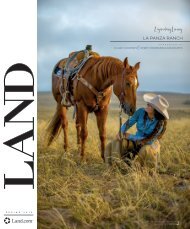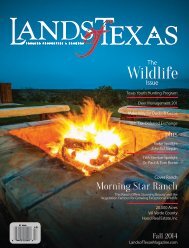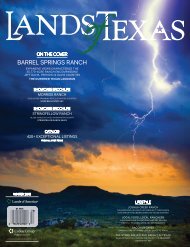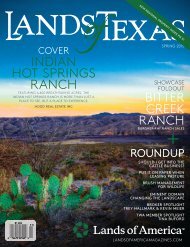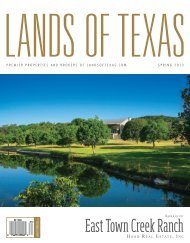Create successful ePaper yourself
Turn your PDF publications into a flip-book with our unique Google optimized e-Paper software.
LAND NEWS<br />
the world and from that he raised hundreds of animals. He’s since sent some<br />
to African reserves for eventual reintroduction into the wild, but he believes the<br />
best hope to sustain the species today lies on the Texas range.<br />
stable or growing.<br />
Logan: The numbers, you can’t argue with that?<br />
Condy: When you’re talking about conservation, it’s the numbers that are the<br />
bottom line.<br />
But for Priscilla Feral, the bottom line is that these animals should not be<br />
hunted. She’s helped create a reserve in Senegal for 175 orxy and in court,<br />
she’s winning the legal battle she’s been fighting for years to stop them from<br />
being hunted in the U.S.<br />
Bamberger: I’ve got ranchers that I started them out on with half a dozen animals<br />
that got 200 now.<br />
Logan: But if you’re a conservationist, and you’ve given up your land, you’ve<br />
given up thousands, millions of dollars to save this species. Yet you’re not against<br />
hunting them?<br />
Bamberger: Well, I wouldn’t do it here. I’m not fond of it at all, but I’m wise<br />
enough, smart enough to know if there’s no incentive, if altruism is the only<br />
incentive you’re not gonna get a great deal of participation on someone whose<br />
livelihood depends on bringing in dollars.<br />
[Logan: You’d think you were in Africa, look at the giraffe sitting there]<br />
We turned to one of the world’s top conservationists, Pat Condy, who lives in<br />
Texas, to find out what he thought.<br />
Pat Condy: That’s the scimitar horned oryx. Altogether, on different ranches,<br />
many different ranches, there are somewhere between six and 10 thousand of<br />
these animals.<br />
Pat Condy has devoted his life to saving animals and he showed us around the<br />
Fossil Rim Wildlife Center outside of Dallas which he runs. It’s a world leader in<br />
breeding rare and endangered animals.<br />
And it’s also a place where tourists can get closer to these beautiful creatures<br />
than they ever could in the wild.<br />
Logan: Do you think that Texas ranches are saving animals from extinction?<br />
Condy: There’s no question about it, that they are.<br />
Logan: What gives you the confidence to say what you’re saying?<br />
Condy: What gives me the confidence is when you look at the numbers, the<br />
animal numbers, okay, and you see that they’re not declining, that they’re either<br />
In April, a new rule issued by the U.S. Fish and Wildlife Service took effect,<br />
making it a crime to hunt the scimitar horned oryx -- and two other endangered<br />
antelope -- without a federal permit. Texas ranchers are challenging the new<br />
rule in court.<br />
Seale: Just since the announcement of that rule the value of those animals has<br />
probably dropped in half. You’ve got to understand, I’m a rancher to make a<br />
profit, just like any business.<br />
Logan: How does this rule change affect that?<br />
Seale: I will say that in five years you’ll see half the numbers that you see today.<br />
And I would venture to guess in 10 years they’ll be virtually none of ‘em left.<br />
Feral: The future for oryxes is Africa. It’s not Texas.<br />
Logan: Can the future not be both? Don’t they have a greater chance of survival<br />
the more of them there are?<br />
Feral: In their native lands.<br />
Logan: Regardless of where they are?<br />
Feral: I don’t think you can say regardless of where they are. A Texas hunting<br />
ranch is not the same as being in a reserve in Senegal.<br />
Condy: Put the hunting aspect to one side, and take a 50,000 foot view over<br />
this, this resource of a species that is extinct in the wild is going to disappear<br />
now from Texas, slowly but surely.<br />
Logan: So who’s winning the day here?<br />
Condy: I don’t think anybody’s winning the day. One thing is for sure, they are<br />
losing it. Those species are losing it.<br />
30 FALL <strong>2012</strong>





